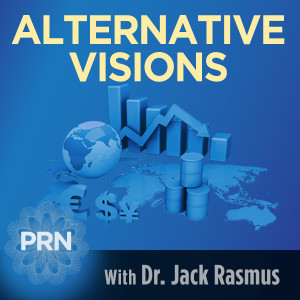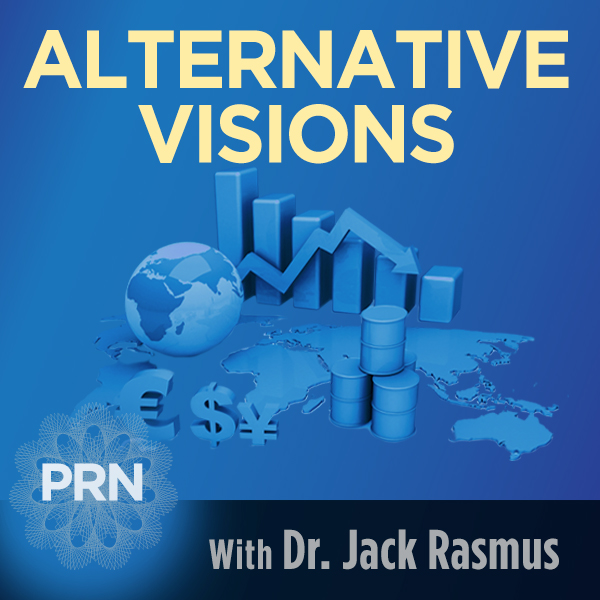Episodes

Friday Sep 11, 2020
Alternative Visions - Bankers Warn of Global ‘Age of Disorder’ Coming
Friday Sep 11, 2020
Friday Sep 11, 2020
Today’s show discusses the recent confidential report issued by Deutsche Bank to its shareholders that the current pandemic and global great recession underway is a reflection and cause of an ‘Age of Disorder’ and the end of Globalization as we know it. The show discusses the Deutsche Bank note which reflects a widespread view among finance capitalists of the state of the global economy today, and likely in the months and years immediately ahead. Today’s show also provides an update on the ‘Not Negotiations’ underway in Congress between Democrats and Republicans over providing a next fiscal stimulus bill before the November elections, which is not likely in our view. Meanwhile the US economy and labor market in particular continue to slow their ‘rebound’ and the media prepares to ‘spin’ the data on GDP when released in October. (For my view of the true level of unemployment and the relapsing labor market in the US, check out my just published article, “America’s Current Jobs ‘Great Depression’, on my blog, jackrasmus.com)

Friday Sep 04, 2020
Alternative Visions - Labor Day in the Era of Covid
Friday Sep 04, 2020
Friday Sep 04, 2020
Today’s show focuses on the condition of American Labor and Unions in the era of Covid. What’s the status of jobs, wages, benefits, union membership today, Labor Day 2020, after 6 months of Covid 19? The first part of the show dissects the August 2020 Employment Report just released this morning. What’s wrong with the statistics and paint a rosier picture of the actual condition of jobs. Why 1.37m jobs created last month are really much less, and those created mostly temp and part time and thus at a much lower wage. Why the number of jobless are actually still 35m and likely much more and rising per recent unemployment claims filings. Why official and media data consistently cherry pick the best numbers to report. For the period February thru August the bigger picture for workers jobs and wages. Why a second wave of permanent further job loss is now emerging. Check out Dr. Rasmus forthcoming article, ‘American Labor in the Age of Covid 19’ posted this Sunday on his blog, jackrasmus.com.

Friday Aug 28, 2020
Friday Aug 28, 2020
Dr. Rasmus comments briefly on the meaning of the just concluded RNC and DNC political conventions: both high on fear and short on specific proposals for ending America’s ‘Triple Crisis’ (Economy, Covid, Constitutional). The ‘Labor State’ of former and active local union leaders running for offices in local government in the San Francisco Bay Area are then welcomed and discuss their group’s programs, strategy and tactics and why they are running for office. Gaelan Ash, with AFSCME and former UAW, union officer and Lacei Amodei, former Local 2 HERE officer, join Dr. Rasmus to discuss why they are venturing forth into independent politics and not within either wing of the Corporate Party of America (aka Trumpublicans or Democrats). This show is the first of several to interview independent political groups and parties over the next four weeks. Others to come include the Peoples Party, Labor-Community Independent Politics, Green Party and others. Is there a growing momentum in the crisis? What happens if no final result on November 3 for the Trump-Biden confrontation, both as an election and as increasingly violent confrontation in the streets, which seems now inevitable? Is America about to become Wiemar, Germany 1926?

Monday Aug 24, 2020
Alternative Visions - More Economists Predicting Great Depression
Monday Aug 24, 2020
Monday Aug 24, 2020
Dr. Rasmus reviews the growing number of mainstream economists now beginning to predict the current economic crisis, either is now or soon may become, another Great Depression. World Bank and Mellon Bank chief economists, Carmen and Vincent Reinhart’s forthcoming essay in the prestigious Foreign Affairs Journal is reviewed. Rasmus notes how their analysis is similar to points he’s been making since March 2020. Other views similar by liberal dean of economics, Paul Krugman, who calls today’s crisis ‘The Greater Recession’ and others are noted. Few mainstream economists now call it a V-shape recovery, unlike this past spring. Rasmus then reviews actual GDP contractions world wide in 2020 and why they suggest a ‘great recession’ that is weakening at best in the 3rd quarter. Why the current economy will weaken: more Covid 19 problems, basic restructuring of the economy, coming political instability, and financial crisis potentially in 2021. (check out my articles at jackrasmus.com blog for updates).

Friday Aug 14, 2020
Alternative Visions - Trump’s Election Plan ‘B’?
Friday Aug 14, 2020
Friday Aug 14, 2020
As Congress goes home it now appears negotiations on a stimulus plan have collapsed, not just broken off. There may be no stimulus package before the November 3 elections. Severing negotiations means Trump’s plan not to negotiate with Democrats and Congress is no longer tactical but strategic. What’s the bigger strategy behind the growing triple crisis in America: Health, Economic and Political? Dr. Rasmus speculates on the elements of Trump’s strategy for November now taking form. How it assumes a continuation of the Covid, Economic, and Constitutional confrontation with Congress. What’s the possible role of a foreign policy crisis in October in a ‘Plan B’? With a deepening Constitutional challenge with the US House of Representatives. What are some scenarios possible after November 3? (Check out Dr. Rasmus’s blog, jackrasmus.com, and his twitter posts for day to day developments, at @drjackrasmus

Friday Aug 07, 2020
Alternative Visions - Slowing Jobs Recovery; Fading 3Q Rebound?
Friday Aug 07, 2020
Friday Aug 07, 2020
In today’s show, Dr. Rasmus comments on the growing economic cold war between US and China, on the status of the Economic Stimulus negotiations in Congress, and the latest US jobs and wage numbers released today by the US Labor Dept. On the China-US economic war, the latest developments involving Microsoft and the forced purchase of China’s ‘TIk Tok’ by Trump. What’s behind it? The latest status on terms of the negotiations in Congress involving unemployment, income checks, rent, local government aid, payroll and other tax measures. What the latest US job numbers for July indicate. (For more on the stalling US economic rebound see Dr. Rasmus’ blog, jackrasmus.com, for latest articles or his twitter posts on daily developments at @drjackrasmus).

Friday Jul 31, 2020
2nd Quarter US GDP Collapses & June Rebound Fading
Friday Jul 31, 2020
Friday Jul 31, 2020
Dr. Rasmus dissects the just released data for US economy’s 2nd quarter GDP stats, confirming his March prediction of W-shape recovery, no V-shape and no 2nd half recovery. The 4 myths are discussed: Fast recovery in 2020; US economy strong in 2019; consumer households were doing great in 2019 and will do again in 3Q20; Congress’s March 2020 Cares Act is enough stimulus. No need to rush to another massive stimulus bill. Review of McConnell Republicans’ HEALsAct vs. Democrats Heroes Act. Two great ‘wild cards’ that could throw the US economy into depression in 2021: Trump generated political-constitutional crisis around Nov. elections + financial instability in 2021 as business and household defaults deepen.

Friday Jul 31, 2020
Alternative Visions - 2nd Quarter US GDP Collapses & June Rebound Fading
Friday Jul 31, 2020
Friday Jul 31, 2020
Dr. Rasmus dissects the just released data for US economy’s 2nd quarter GDP stats, confirming his March prediction of W-shape recovery, no V-shape and no 2nd half recovery. The 4 myths are discussed: Fast recovery in 2020; US economy strong in 2019; consumer households were doing great in 2019 and will do again in 3Q20; Congress’s March 2020 Cares Act is enough stimulus. No need to rush to another massive stimulus bill. Review of McConnell Republicans’ HEALsAct vs. Democrats Heroes Act. Two great ‘wild cards’ that could throw the US economy into depression in 2021: Trump generated political-constitutional crisis around Nov. elections + financial instability in 2021 as business and household defaults deepen.

Monday Jul 27, 2020
Alternative Visions - US Economy: Relapsing from Rebound
Monday Jul 27, 2020
Monday Jul 27, 2020
Dr. Rasmus discusses the latest data showing a rise once again in unemployment and benefit claims. Why it’s a harbinger of a relapse and W-shape recovery now emerging more clearly. The dual causes behind the rising job losses: covid resurgence and permanent layoffs by big corporations. A detailed review of what’s known of the status of current negotiations in Congress over the Heroes Act follows. The major elements of the Republican-McConnell proposals are reviewed. (Check out more details in Dr. Rasmus’s recently published article, ‘What Lies Ahead’, available on his blog at jackrasmus.com). Next Week: more detail on the Heroes Act negotiations.

Friday Jul 17, 2020
Alternative Visions - : What Lies Ahead
Friday Jul 17, 2020
Friday Jul 17, 2020
Dr. Rasmus discusses his latest blog piece, ‘What Lies Ahead’ (see jackrasmus.com). The 8 factors that intermediate to long term may mean the current Great Recession experiences a major economic relapse, and W Shape trajectory in the next 6 to 18 months. More permanent 2nd jobless wave, weak Heroes Act fiscal stimulus next week, wave of unemployment benefits loss and rent evictions, child care and education system crisis, state & local government defaults, (and muni market crash), permanent transformation of industries, return to austerity in 2021 by politicians, business and government defaults, bankruptcies and financial instability, and US political instability are candidates for pushing the US (and global) economy. Also discussed are this past week’s Banks putting away tens of billions more of emergency cash as hedge against defaults coming. Today’s show and article are a sequel to last week’s short term look (3 mos) why the current June economic rebound will falter. See both articles on jackrasmus.com.

